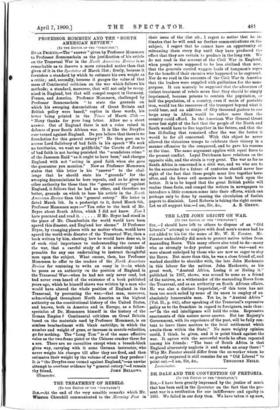THE LATE JOHN BRIGHT ON WAR.
[To THE EDITOR OF THE "SPECTATOR."] SIR, —I should have left to others to dispose of an " Old Liberal's" attempt to conjure with dead men's names had he rot added to his list the name of Mr. W. E. Forster. Mr. Forster undoubtedly did much to protect native tribes from marauding Boers. This many others also tried to do—many who as strongly to-day protest against the war—and we were almost unhelped by those who are now so eager to slay the Boers. But more than this, he was a close friend of, and worked shoulder to shoulder with, the late John Mackenzie in this labour for the natives. John Mackenzie, as his great work, "Austral Africa, Losing it or Ruling it," published in 1887, shows, was second to none as a friend of the natives, as a withstander of the marauding Boers from the Transvaal, and as an authority on South African affairs. He was also a distinct Imperialist,—if this term has not been too much soiled by some of its users to employ of an absolutely honourable man. Yet he, in "Austral Africa" (Vol. II., p. 442), after speaking of the Transvaal's repressive policy as to the franchise in regard to foreigners, ends thus : —" In the end intelligence will hold the reins. Repressive enactments of this nature never answer. But her Majesty's Government, with its experience of the past, will be fully con- tent to leave these matters to the local settlement which awaits them within the State." No more weighty opinion could, I think, be given, and it is point blank against the war. It agrees with the sorrowful words he often repeated among his friends : "The bane of South Africa is that England alternately neglects it and sends an army there ! " Why Mr. Forster should differ from the co-worker whom be so greatly respected it still remains for an " Old Liberal " to






































 Previous page
Previous page